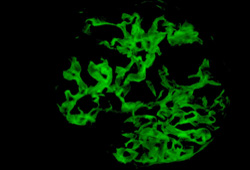Summary
Definition
History and exam
Key diagnostic factors
- redução de débito urinário
- hemoptise
- edema
Other diagnostic factors
- sexo masculino
- 20 a 30 ou 60 a 70 anos de idade
- dispneia
- tosse
- febre
- náuseas
- estertores no exame pulmonar
Risk factors
- HLA-DRB1 ou DR4
- tabagismo
- exposição a hidrocarbonetos, solventes orgânicos, metais pesados
- história de litotripsia
- infecções respiratórias recentes
- imunoterapia
- após transplante renal em pacientes com síndrome de Alport
Diagnostic tests
1st tests to order
- teste da função renal
- biópsia renal
- título de anticorpo antimembrana basal glomerular (anti-GBM)
- anticorpo anticitoplasma de neutrófilo (ANCA)
- complemento sérico (C3 e C4)
- fator antinuclear (FAN)
- crioglobulinas
- painel de hepatite
- título de antiestreptolisina O
- exames de coagulação
Treatment algorithm
suspeita de glomerulonefrite rapidamente progressiva
doença renal reversível ou qualquer envolvimento pulmonar
doença renal irreversível e ausência de evidências de comprometimento pulmonar
sem resposta ao tratamento inicial
Contributors
Authors
Tingting Li, MD, MSCI, FASN
Professor of Medicine
Director, Glomerular Diseases Program
Division of Nephrology
Washington University School of Medicine in St Louis
St Louis
MO
Disclosures
TL receives research support from Travere Therapeutics, Omeros Corporation, and the US NIH/NIAID, and reports consultancy agreements with ChemoCentryx, Travere Therapeutics, Amgen, Aurinia Pharmaceuticals, Calliditas Therapeutics, and GlaxoSmithKline. She also serves as a board member of GlomCon and a member of the ASN Publications Committee.
Christina Mariyam Joy, MD
Assistant Professor of Medicine
Division of Nephrology
Froedtert and Medical College of Wisconsin
Milwaukee
WI
Disclosures
CMJ declares that she has no competing interests.
Acknowledgements
Dr Tingting Li and Dr Christina Mariyam Joy would like to gratefully acknowledge Dr Richard G. Phelps, Professor Andre A. Kaplan and Dr Michael S. Gersch, previous contributors to this topic. RGP and MSG declare that they have no competing interests. AAK has received honoraria in 2013 to speak about plasma exchange from Gambro and Alexion (Gambro manufactures products for plasma exchange and Alexion manufactures a complement cascade inhibitor).
Peer reviewers
Dorin-Bogdan Borza, PhD
Assistant Professor of Medicine
Division of Nephrology
Department of Medicine
Vanderbilt University School of Medicine
Nashville
TN
Disclosures
DBB declares that she has no competing interests.
Peer reviewer acknowledgements
BMJ Best Practice topics are updated on a rolling basis in line with developments in evidence and guidance. The peer reviewers listed here have reviewed the content at least once during the history of the topic.
Disclosures
Peer reviewer affiliations and disclosures pertain to the time of the review.
References
Key articles
Pusey CD. Anti-glomerular basement membrane disease. Kidney Int. 2003 Jul 7;64(7):1535-50. Abstract
Shah MK, Hugghins SY. Characteristics and outcomes of patients with Goodpasture's syndrome. South Med J. 2002 Dec;95(12):1411-8. Abstract
Kluth DC, Rees AJ. Anti-glomerular basement membrane disease. J Am Soc Nephrol. 1999 Nov;10(11):2446-53.Full text Abstract
Connelly-Smith L, Alquist CR, Aqui NA, et al. Guidelines on the use of therapeutic apheresis in clinical practice - evidence-based approach from the Writing Committee of the American Society for Apheresis: the ninth special issue. J Clin Apher. 2023 Apr;38(2):77-278. Abstract
Kidney Disease: Improving Global Outcomes (KDIGO) Glomerular Diseases Work Group. KDIGO 2021 clinical practice guideline for the management of glomerular diseases. Kidney Int. 2021 Oct;100(4s):S1-S276.Full text Abstract
Reference articles
A full list of sources referenced in this topic is available to users with access to all of BMJ Best Practice.

Differentials
- Lúpus eritematoso sistêmico
- Granulomatose com poliangiíte (de Wegener)
- Poliangiite microscópica
More DifferentialsGuidelines
- Guidelines on the use of therapeutic apheresis in clinical practice - ninth special issue
- Clinical practice guideline for glomerulonephritis
More GuidelinesLog in or subscribe to access all of BMJ Best Practice
Use of this content is subject to our disclaimer